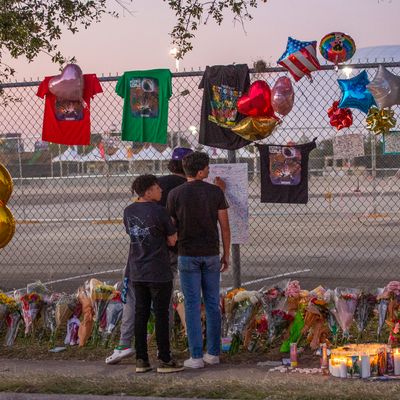
Probably there have been efforts at crisis PR less successful than Travis Scott’s partnership with BetterHelp, but none comes immediately to mind. Scott’s Astroworld performance in Houston on November 5 left ten people dead and hundreds more injured after a terrifying crowd surge. In the days that followed, Scott tweeted a Notes app statement sending his prayers — though not, as many noted, his apologies, which might have seemed an admission of liability — “to the families and all those impacted by what happened at Astroworld Festival.” He posted an Instagram video explaining that he hadn’t been able to see “the severity of the situation” from onstage. And he announced that in addition to covering funeral costs for the victims, he was partnering with the therapy app BetterHelp to offer a free month of service for Astroworld attendees. “Following the tragic event at Astroworld, Travis Scott’s team reached out to us with an initiative to cover the cost of therapy for those who were impacted,” BetterHelp explained in a statement. “As a mission-driven organization, we are proud to help whenever we can.”
Sincere though Scott’s desire to aid his fans might be, the public appearance of Doing Something was surely at least a fringe benefit, and the reaction cannot have been what he or BetterHelp had hoped. Press coverage described the partnership as a “strange,” “exploitative,” and “controversial” gesture that had inspired swift “backlash,” sending BetterHelp “scrambling.” Perhaps the closest thing to a positive response was “Therapists hesitant to dismiss Travis Scott’s BetterHelp offer” or “Travis Scott’s PR Move After Astroworld Could Actually Do Some Good.” Salon captured the general mood: “We can’t help but be cynical about Travis Scott’s post-Astroworld BetterHelp partnership.”
In an explanatory Q&A, the scrambling BetterHelp sought to assuage public concern. For example:
Is there a sponsorship or brand deal between BetterHelp and Travis Scott?
No. This is not a sponsorship or paid endorsement of any kind.
Is BetterHelp paying Travis Scott in any way?
No.
No, participants would not be waiving any legal rights; no, they would not be billed upon completion of their free month. Also:
Does BetterHelp offer a free month of therapy to all customers on a regular basis?
No. BetterHelp provides free therapy only on specific occasions.
It is true, I guess, that World Mental Health Day is a specific occasion: the occasion for a BetterHelp partnership with Ariana Grande, in this case. It is harder to see how being a member of the Virginia Pharmacists Association, the Northwoods Presbyterian Church, the NYPD, the Ada Developers Academy, a customer of the lingerie brand Va Bien or greeting-card company Thoughtful Human, or a fan of women’s tennis — to name just a handful of the one-month-free deals BetterHelp currently lists — would qualify as an “occasion,” per se. But the company’s weird defensiveness on this point is striking. BetterHelp would like to insist that its Astroworld offer is not business as usual, when even a vague familiarity with its many deals and discounts (all those podcast promo codes!) suggests it is.
Could the widespread revulsion that BetterHelp and Travis Scott inspired indicate a growing skepticism for the business-as-usual of therapy apps? Earlier this year, I spent a couple months talking to clients, clinicians, and researchers about services like BetterHelp and Talkspace, and in the story I wrote, I described the frustrations many felt. Everyone agreed that access to mental-health care was a problem, and that services promising to make it faster and easier (and maybe cheaper) held a powerful appeal. But the fundamental senses of trust and reliability on which therapy depends were often missing on the apps. Personal connection was not easy to scale, and companies’ efforts to pretend otherwise led to overworked, underpaid therapists and frustrated clientele. Many were left feeling that these services might be better than nothing, but not much.
A disaster like the deaths at Astroworld makes the shortcomings of “better than nothing” glaringly apparent. “If you watched your friends die at the Travis Scott concert you get one free month of @betterhelp,” one tweet put it, which, in its bald statement of facts, captured the problem of therapy apps. What galled was less the possibility that Scott might make money off the deal than such an offer’s patent inadequacy as an answer to human pain. Let the public reaction stand as a lesson to celebrities in crisis — but also, I hope, to the employers and insurers who treat therapy apps as a Band-Aid for mental-health care.

